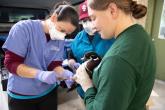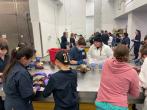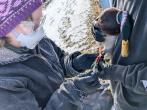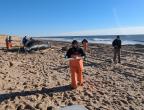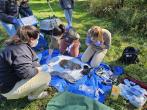We offer a range of training opportunities for students interested in pursuing careers in wildlife health. For example, Dr. Schuler hosts an annual lecture and wet lab on chronic wasting disease (CWD), in which students learn to age deer by examining tooth wear and replacement, extract CWD samples, and examine the brain/skull for Parelaphostrongylus tenuis (brainworm). Dr. Bloodgood hosts a marine mammal necropsy workshop annually, providing hands-on instruction in clinical techniques and necropsy methods for pinnipeds and cetaceans.
In 2023, Cornell initiated a wildlife veterinary specialty internship program, and in 2025, a veterinary residency in wildlife health was established. These advanced programs provide comprehensive, hands-on training across multiple disciplines, including clinical wildlife medicine at the Janet L. Swanson Wildlife Hospital, diagnostic pathology, and population health with the Cornell Wildlife Health Lab. With the CWHL, interns and residents gain direct experience in free-ranging wildlife research, disease surveillance, mortality investigations, and wildlife capture and chemical immobilization. Past activities have included bobcat health surveillance, avian influenza monitoring in waterfowl, waterfowl banding, and large-whale necropsies.


